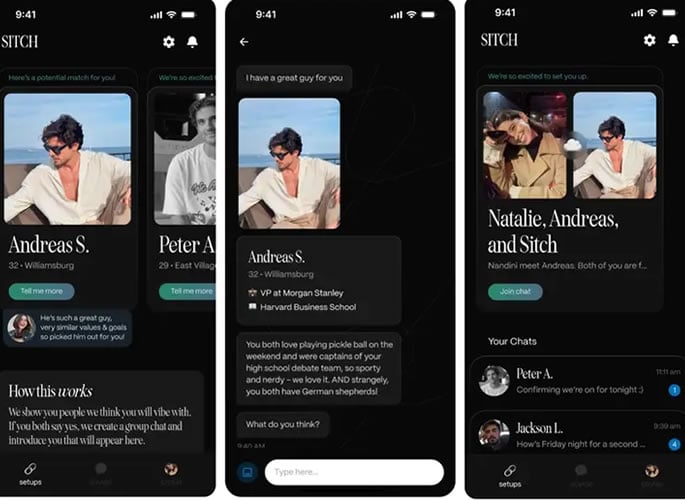Sitch could be the solution to modern dating and for co-founder Nandini Mullaji, romantic setups have always been a way of life.
The 30-year-old grew up in Mumbai where “matchmaking is a very, very strong part of the culture”. Her grandmother was a matchmaker and successfully set up two of her aunts.
Nandini attended boarding school in the US, studied at Georgetown University, then earned an MBA and a master’s in education at Stanford.
It was there that she noticed a key problem with modern dating: people were tired of swiping.
Her friends were “successful, good-looking, amazing women”, but “they were terrified of having to get back on the apps”.
In 2023, Nandini, who was part of the team that launched Bumble in India, launched her first dating app called Setup. It matched users based on availability during the week. But she quickly realised it was not a complete solution.
She said: “It didn’t feel like this big, life-changing product. It felt like a feature.”

In 2024, she met Chad DePue, who had led teams at Snapchat and Microsoft. The two saw an opportunity to use large language models like ChatGPT to create an AI matchmaker rooted in Indian matchmaking traditions.
They built Sitch, a pay-per-setup app that launched in December 2024. As of July 2025, Sitch has raised $6.7 million in funding and has “tens of thousands of users”.
According to Nandini, there are flaws in traditional dating apps as users have too many options and conversations rarely lead to dates.
A 2022 Stanford study of over 1,000 Tinder users found that half were not interested in meeting offline.
She adds that dating apps provide limited, superficial information, leading to a “fundamental mismatch of values that would only reveal itself after a few dates”.
Sitch’s AI matchmaker is designed to fix that by doing the work upfront.
Unlike Bumble, which uses AI mainly for safety, or Hinge, which offers AI coaching, Sitch promises a “personal matchmaker that’s actually affordable, and will introduce you to someone you will actually vibe with”.
Singletons download the app or request a phone call via its website to speak to an AI chatbot trained on Nandini’s matchmaking experience, even using her voice.
The AI asks questions ranging from interests and ideal dates to past relationships and dating goals. Once it has at least five possible matches, it starts sending them to the user. If there’s mutual interest, the AI makes an introduction in a group chat.
Users pay for successful setups, with packs of three, five or eight priced at $90, $125 or $160. The company says charging ensures users are “serious and committed to actually meeting people IRL”.
But there are risks, such as wrong advice or hallucinating details as Nandini admitted:
“It can go rogue with the conversation.
“But I think these are things that we’re going to be able to fix as time goes on.”
Nandini says one advantage over human matchmakers is that users are more open.
That honesty helps the AI filter for compatibility, saving users time and money. New applications are manually reviewed and include a selfie verification.

Sitch is live in New York, San Francisco and Los Angeles, with thousands of dates already arranged.
Karishma Thawani has been on multiple Sitch dates. She says the app “feels more curated” and added:
“I feel special when I get an introduction every week. I wait for it.”
Nandini said: “That kind of help and approach is really our vision.
“[To] give every single person someone who can help guide them on the journey of learning about who they are, what they’re looking for, finding that person, falling in love and staying in love.”
Sitch plans to launch in Chicago and Austin by the end of 2025.
Nandini added: “We hope that Sitch is global by 2030.
“That we have democratised access to having a matchmaker to help you make life’s most important decision.”






























































